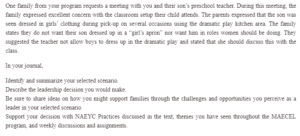Role Play in Child Development
One of the families from the program requested a meeting to discuss their son with the preschool teacher. The family is concerned because they are not happy with the classroom setup. The son has been spotted dressing up in lady’s aprons. The family members clearly stated that they do not want their son to participate in or play female roles in the classroom.
In this case, I opted to create awareness among the family members regarding the importance of roleplay among the children. Role play is critical for children’s development. It enables children to gain confidence, improve their communication and physical growth, and solve problems. Child-led or directed roleplaying is critical to these processes of growth. Roleplaying encourages the young to take risks and participate in new activities (Vlaicu, 2014). The participation is filled with creative thoughts and actions.
Roleplaying is an educational tool that facilitates learning. The boy in the case study can be in the shoes of females in the kitchen area when he wears a girl-like apron. This setup and area represent real-life situations the children encounter in their homes and other environments. The children understand the real-life environment and activities in that setting.
I chose the option of creating awareness because the family members presented their arguments from a lack of knowledge regarding the importance of roleplay. They tend to pay greater attention to aspects that do not add value to the child’s learning experience. Ensuring that they understand the reasons for creating areas that allow children to pretend play is critical in supporting their child’s learning process. They can also begin to appreciate the benefits that their son picks in pretend play and reinforce these.
This case highlights the lack of knowledge among parents regarding roleplay for their children. This lack of knowledge and information hinders the moral support that the children could get from their parents to pretend to play, even at home. Children must access development opportunities to become all-rounded. Individuals. Roleplay highlights clear benefits for emotional, social, cognitive, and physical development. Roleplaying a child from role play denies them numerous development opportunities.
Like every other concept, roleplaying has its positive and negative roleplaying; however, the positive elements outdo the negative ones. This makes roleplaying an ideal mode of instruction in the lower grades. Allowing their creativity to flow without limitations facilitates accumulating experience regarding real-life or fictional situations (Vlaicu, 2014). The child’s curiosity regarding distinct roles is satisfied sufficiently.
To ensure that all parents and guardians know and accept pretend play, I will urge the administration to organize a meeting or a seminar. The gathering will give a chance to understand how their children pretend play and the benefits they gain. They will also have an opportunity to ask questions that may cause unrest. Clarifying these issues is essential in ensuring all parents and instructors are on the same page. This is my responsibility as a leader because I must maximize the participation of all the critical stakeholders for the children’s good (Manning & Curtis, 2012).
References
Manning, G., & Curtis, K. (2012). The Art of Leadership. McGraw-Hill Irwin.
Vlaicu, C. (2014). The Importance of Role Play for Children’s Development of Socio-Emotional Competencies. Social Sciences(1), 157-167. https://doi.org/10.18662/lumenss.2014.0301.14.
ORDER A PLAGIARISM-FREE PAPER HERE
We’ll write everything from scratch
Question 
One family from your program requests a meeting with you and their son’s preschool teacher. During this meeting, the family expressed excellent concern with the classroom setup their child attends. The parents expressed that the son was seen dressed in girls’ clothing during pick-up on several occasions using the dramatic play kitchen area. The family states they do not want their son dressed up in a “girl’s apron” nor want him in roles women should be doing. They suggested the teacher not allow boys to dress up in the dramatic play and stated that she should discuss this with the class.

Role Play in Child Development
In your journal,
Identify and summarize your selected scenario.
Describe the leadership decision you would make.
Be sure to share ideas on how you might support families through the challenges and opportunities you perceive as a leader in your selected scenario.
Support your decision with NAEYC Practices discussed in the text, themes you have seen throughout the MAECEL program, and weekly discussions and assignments.